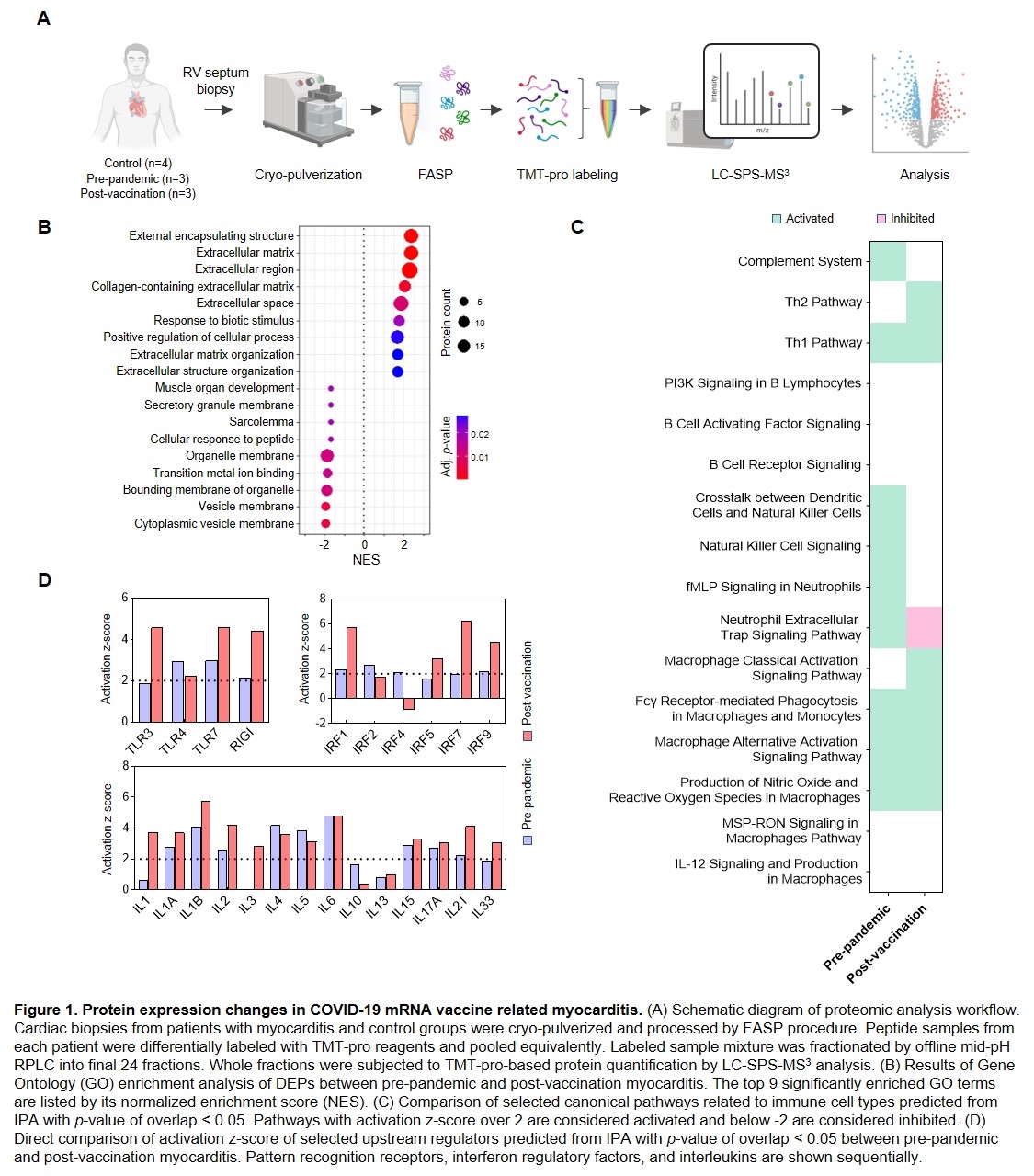Final ID: MDP204
Comparative Proteomic Analysis of Myocarditis: COVID-19 mRNA Vaccination vs. Pre-Pandemic Viral Etiologies
Abstract Body (Do not enter title and authors here): Introduction: Myocarditis has been reported after mRNA-based COVID-19 vaccination, but the immune mechanisms remain unclear. This study aimed to identify the proteome-based immunopathogenesis of post-vaccination myocarditis compared to viral myocarditis in the pre-COVID-19 era.
Methods: Proteomic analysis of right ventricle (RV) biopsy specimens was performed in myocarditis patients (pre-pandemic viral myocarditis: n=3, post-vaccination myocarditis: n=3) and controls (normal endomyocardial biopsy specimens of heart transplant recipients, n=4) using mass spectrometry. Differentially expressed proteins were analyzed with CIBERSORTx, Gene Ontology (GO) analysis, and Ingenuity Pathway Analysis (IPA). To examine the relationship between the SARS-CoV-2 spike protein and post-vaccination myocarditis, immunohistochemistry (IHC), mass spectrometry analysis of spike protein, and activation-induced marker (AIM) assay in T cells from RV samples were conducted.
Results: In the proteomic analysis, 6,861 proteins were identified. Post-vaccination myocarditis showed increased extracellular matrix formation and cardiac fibrosis. Both pre-pandemic and post-vaccination myocarditis had elevated pro-inflammatory cytokine activities. However, post-vaccination myocarditis exhibited higher expression of interferon-alpha (IFNα) and pattern recognition receptor activation, including TLR3 and TLR7. Pre-pandemic myocarditis showed higher activation of the complement system, neutrophils, and NK cells, whereas post-vaccination myocarditis showed increased Th2 cell activation and classical macrophage activation. Spike protein and related T-cell activation were not detected.
Conclusion: The immune activation in myocarditis after COVID-19 mRNA vaccination may be triggered by the mRNA in the vaccine via an IFNα-driven immune response, leading to autoimmune-like features. Further studies are necessary to validate whether these proteins correlate with clinical characteristics.
Methods: Proteomic analysis of right ventricle (RV) biopsy specimens was performed in myocarditis patients (pre-pandemic viral myocarditis: n=3, post-vaccination myocarditis: n=3) and controls (normal endomyocardial biopsy specimens of heart transplant recipients, n=4) using mass spectrometry. Differentially expressed proteins were analyzed with CIBERSORTx, Gene Ontology (GO) analysis, and Ingenuity Pathway Analysis (IPA). To examine the relationship between the SARS-CoV-2 spike protein and post-vaccination myocarditis, immunohistochemistry (IHC), mass spectrometry analysis of spike protein, and activation-induced marker (AIM) assay in T cells from RV samples were conducted.
Results: In the proteomic analysis, 6,861 proteins were identified. Post-vaccination myocarditis showed increased extracellular matrix formation and cardiac fibrosis. Both pre-pandemic and post-vaccination myocarditis had elevated pro-inflammatory cytokine activities. However, post-vaccination myocarditis exhibited higher expression of interferon-alpha (IFNα) and pattern recognition receptor activation, including TLR3 and TLR7. Pre-pandemic myocarditis showed higher activation of the complement system, neutrophils, and NK cells, whereas post-vaccination myocarditis showed increased Th2 cell activation and classical macrophage activation. Spike protein and related T-cell activation were not detected.
Conclusion: The immune activation in myocarditis after COVID-19 mRNA vaccination may be triggered by the mRNA in the vaccine via an IFNα-driven immune response, leading to autoimmune-like features. Further studies are necessary to validate whether these proteins correlate with clinical characteristics.
More abstracts on this topic:
A Multi-Population-First Approach Leveraging UK Biobank (UKBB) and All of Us (AoU) Datasets Reveals Higher Cardiomyopathy Variant Burden in Individuals with Myocarditis
Gurumoorthi Manasa, Khanji Mohammed, Munroe Patricia, Petersen Steffen, Landstrom Andrew, Chahal Anwar, Hesse Kerrick, Asatryan Babken, Shah Ravi, Sharaf Dabbagh Ghaith, Wolfe Rachel, Shyam Sundar Vijay, Mohiddin Saidi, Aung Nay
Age-Related Impairment of Mitochondrial Protein Turnover Exacerbates Pathogenesis of Heart Failure with Preserved Ejection Fraction in Old MiceKobak Kamil, Zarzycka Weronika, King Catherine, Borowik Agnieszka, Peelor Frederick, Kinter Michael, Miller Benjamin, Chiao Ying Ann

